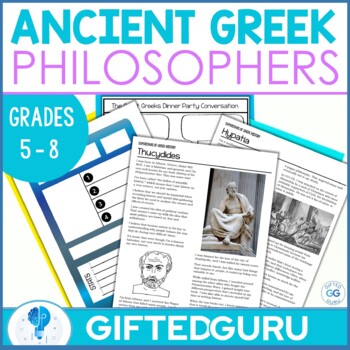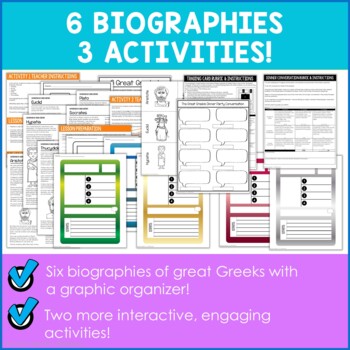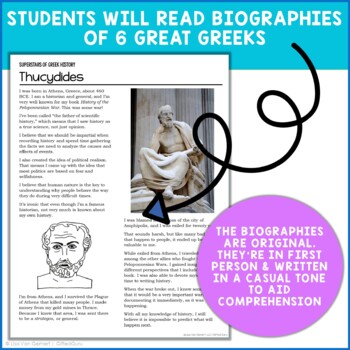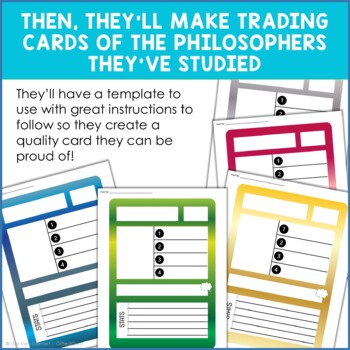Ancient Greek Philosophers of Ancient Greece Activities Middle School 6th grade
- PDF
What educators are saying
Description
Interactive? Check! Engaging? Check! Deep thinking? Check! Your students will love learning about Classical Greek philosophers with this set of three activities that focus on six philosophers of Ancient Greece. They'll learn about Hypatia, Socrates, Plato, Aristotle, Euclid, and Thucydides in original one-page biographies, and then they'll create trading cards about the philosophers. In the third activity, they will select three of the philosophers and create an imaginary conversation they would share at a dinner party.
This set of activities will fill your classroom with creative energy, as well as strong understanding of these famous Greeks! The activities are surprisingly low-prep for how engaging and interactive they are. Simply print, cut, and go! You'll get teacher instructions, classroom procedures, printable activities and biographies and rubrics. The teacher directions are so detailed! You will have very clear, step-by-step instructions for what to do to teach the activity. You'll be surprised at how much your students learn about these Greek philosophers.
Included in this Philosophers of Ancient Resource:
✅ Teacher instructions and ideas
✅ Six Greek Superstars!
✅ Trading Cards
✅ Dinner Party Conversation
✅ Rubrics
Your upper-elementary, middle school, or junior high social studies students will love these activities!
Learn More about the Activities about the Philosophers of Ancient Greece!
⭐ SIX GREEK SUPERSTARS: In this activity, students read six one-page biographies of philosophers of Ancient Greece. They'll read about Hypatia, Socrates, Plato, Aristotle, Euclid, Thucydides in original, enjoyable biographies, recording key points on a graphic organizer.
⭐ TRADING CARDS: In this activity, students create trading cards for the two of the philosophers they read about in the first activity. You'll get an easy-to-use template and graphics for students to use, as well as a rubric for evaluating the trading cards.
⭐ DINNER PARTY: As a culminating activity, students will create an imaginary dinner party conversation among three of the philosophers. They will make up questions and responses. Student instructions are included with the rubric.
--------------
⭐⭐WILLIAMS' MODEL OF CREATIVITY ⭐⭐
This lesson is based on Williams' Model of Creativity, a model designed to develop the traits of creativity in students. This particular resource focuses on these traits:
☀️ Originality - the ability to think of unique ideas
☀️ Elaboration - the ability expand on ideas
☀️ Imagination - the ability to build mental pictures and visualize possibilities
In addition to addressing standards and providing an engaging and effective classroom experience, these activities will also build students' creativity skills.
Frequently Asked Questions:
- I've never heard of the Williams' Model before. Is that a problem? Nope! These lessons are designed to be plug-and-play. I've done all the Williams' work for you (choosing traits to develop and strategies to use). All you need to do is use the activities. The activities will do the rest!
- Some of my students are not strong readers. Can they handle these biographies? Yes. I wrote them all, and I wrote them in first-person narration to make them very approachable. The text is broken up into very short paragraphs. They're one-page, and that page has two columns and a graphic. They're casual in tone, so even struggling readers should be successful.
- Do my students need technology for the trading cards? I don't have easy access to devices. Nope. They just need paper. If you have technology, you can send them templates to Google Classroom to be done electronically, but they're designed to be created with no more sophisticated technology than a pair of scissors!
- We don't study Hypatia. Why did you include her? Because she's fascinating! In a world dominated by men, she stands out as a famous and fabulous exception. Including her makes the activities more interesting and diverse.
❤️ IF YOU LIKE QUALITY ACTIVITIES FOR YOUR STUDENTS, YOU MAY ALSO WANT:
✨ Depth and Complexity Ebook BUNDLE | Question Stems and Quick Guide
✨ Landforms Interactive Review Game with Google Slides™ and PowerPoint™
✨ Geography Activities Geographer's Tools Upper Elementary Social Studies
Connect with me!
✨ Be sure to follow my TpT store by clicking on the red ‘Follow Me’ next to my Seller picture to receive notifications of new products and upcoming sales.
✨ Come on over to Facebook or Instagram and join in the Gifted Guru ideas and tips fun!





